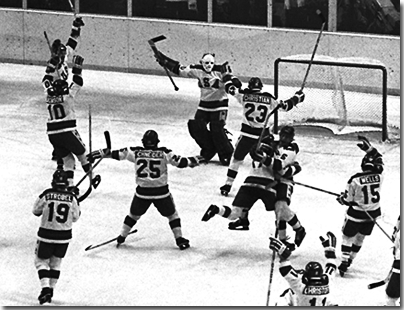Last week in Sweden, some 600 000 people stayed up or got up in the middle of the night to watch the World Juniors final between Sweden and Russia on TV. The average was 530 000 and by the time Mika Zibanejad beat Andrei Makarov in the Russian net, 600 000 people had tuned in.
And the way the game ended, it was obviously worth losing some sleep.
After the game, Sweden’s Jeremy Boyce-Rotevall said that Zibanejad had told him before the game that he’d “finish this game off.” A bold prediction coming from a player who had scored just three goals in the tournament, against Latvia and Slovakia – but he backed it up.
“I [repeated it to Boyce-Rotevall] before the overtime too so it was good to get that goal,” Zibanejad said. “You have to decide if you want to win this. In the morning, it was a joke, but obviously it’s not a joke anymore.”
No, it’s no joke. And every time we repeat it, it becomes a little more of a truth until it becomes a true legend.

And when Zibanejad goes on to having a great career, winning Stanley Cups, and World Championship and Olympic golds – I throw those in here to show that I am European and that we do care about such things – it will all come back to the World Juniors overtime goal, the golden goal, he scored.
Sometimes it seems that people’s careers are made (and broken) in moments like that. Somebody is in the right place at the right time, and scores a big goal and everything seems to change.
Mike Eruzione scored the game winner against the Soviet Union, and clinched the Miracle on Ice in the 1980 Olympics. A few years ago that goal was voted “the greatest highlight of all time” on ESPN. Eruzione retired after the Olympics but the goal opened doors and other opportunities that probably wouldn’t have opened for him.
In the fall of 1981, I showed a bearded, young American guy how to strike a Finnish 20-pence coins really hard into the slot of the Helsinki arena cafeteria pinball machine to start a game that actually cost a whole one markka.
His name was Phil Verchota, and he, too, had been a miracle worker in the winter of 1980. In Helsinki, he played for the Helsinki Jokerit in the Finnish SM-liiga, scored 15 goals in 32 games, but his team finished last, and he took a sabbatical from hockey.
At least Verchota had made the US Olympic team, but somebody also has to be the last player not to make the team. On Herb Brooks’s Olympic team, that player was Ralph Cox, who came to Finland a year after Verchota.
Their roles might just as well have been reversed.
When coaches say that the games are so close that a lucky bounce can be the difference, they’re not kidding, especially in tournament play, like the Olympics or the World Championships. Last May, when Finland won the Worlds in Bratislava, Slovakia, it had to go through one overtime win, and three wins in a penalty shootout to get to the playoff stage.
The Swedish junior team beat Switzerland in a shootout, Russia in OT, Finland in the semifinal in a shootout, and Russia again, in OT, in the final.
And then, suddenly, a good backcheck by a Swedish defenseman going one way, a moment of hesitation by a Russian defenseman going the other, and Zibanejad found himself on a breakaway – and then under a pile of teammates, on fake stamps in the papers, and on a stage in downtown Stockholm in front of 6,000 people who were screaming his name.
Zibanejad’s teammate Pontus Åberg has seven goals and 14 points in 29 games with Djurgården, fourth on the team in goals, and sixth in points. (Zibanejad has six points in 13 games). Åberg, too, could have been on the stage, but he suffered a shoulder injury in the team’s last exhibition game before the tournament, against Canada, and had to return to Sweden.
His replacement flew in from Sweden the next day. His name was Jeremy Boyce-Rotevall.
